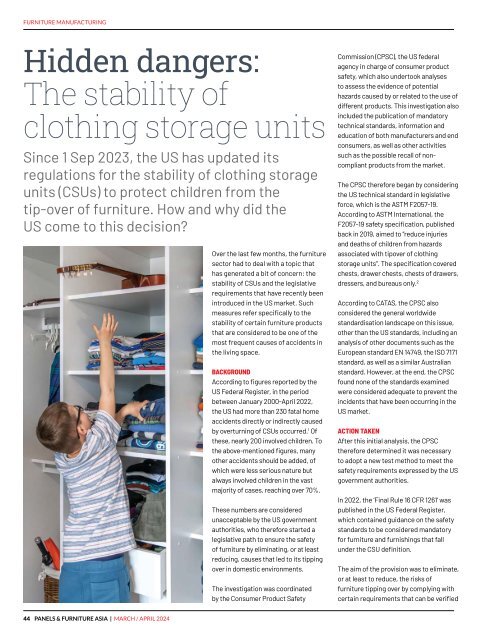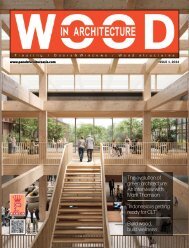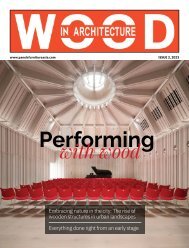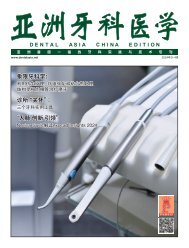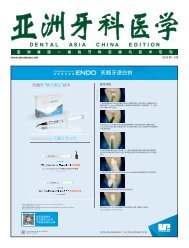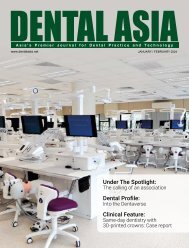Panels & Furniture Asia March/April 2024
Panels & Furniture Asia (PFA) is a leading regional trade magazine dedicated to the woodbased panel, furniture and flooring processing industry. Published bi-monthly since 2000, PFA delivers authentic journalism to cover the latest news, technology, machinery, projects, products and trade events throughout the sector. With a hardcopy and digital readership comprising manufacturers, designers and specifiers, among others, PFA is the platform of choice for connecting brands across the global woodworking landscape.
Panels & Furniture Asia (PFA) is a leading regional trade magazine dedicated to the woodbased panel, furniture and flooring processing industry. Published bi-monthly since 2000, PFA delivers authentic journalism to cover the latest news, technology, machinery, projects, products and trade events throughout the sector. With a hardcopy and digital readership comprising manufacturers, designers and specifiers, among others, PFA is the platform of choice for connecting brands across the global woodworking landscape.
Create successful ePaper yourself
Turn your PDF publications into a flip-book with our unique Google optimized e-Paper software.
FURNITURE MANUFACTURING<br />
Hidden dangers:<br />
The stability of<br />
clothing storage units<br />
Since 1 Sep 2023, the US has updated its<br />
regulations for the stability of clothing storage<br />
units (CSUs) to protect children from the<br />
tip-over of furniture. How and why did the<br />
US come to this decision?<br />
Over the last few months, the furniture<br />
sector had to deal with a topic that<br />
has generated a bit of concern: the<br />
stability of CSUs and the legislative<br />
requirements that have recently been<br />
introduced in the US market. Such<br />
measures refer specifically to the<br />
stability of certain furniture products<br />
that are considered to be one of the<br />
most frequent causes of accidents in<br />
the living space.<br />
BACKGROUND<br />
According to figures reported by the<br />
US Federal Register, in the period<br />
between January 2000-<strong>April</strong> 2022,<br />
the US had more than 230 fatal home<br />
accidents directly or indirectly caused<br />
by overturning of CSUs occurred. 1 Of<br />
these, nearly 200 involved children. To<br />
the above-mentioned figures, many<br />
other accidents should be added, of<br />
which were less serious nature but<br />
always involved children in the vast<br />
majority of cases, reaching over 70%.<br />
These numbers are considered<br />
unacceptable by the US government<br />
authorities, who therefore started a<br />
legislative path to ensure the safety<br />
of furniture by eliminating, or at least<br />
reducing, causes that led to its tipping<br />
over in domestic environments.<br />
The investigation was coordinated<br />
by the Consumer Product Safety<br />
Commission (CPSC), the US federal<br />
agency in charge of consumer product<br />
safety, which also undertook analyses<br />
to assess the evidence of potential<br />
hazards caused by or related to the use of<br />
different products. This investigation also<br />
included the publication of mandatory<br />
technical standards, information and<br />
education of both manufacturers and end<br />
consumers, as well as other activities<br />
such as the possible recall of noncompliant<br />
products from the market.<br />
The CPSC therefore began by considering<br />
the US technical standard in legislative<br />
force, which is the ASTM F2057-19.<br />
According to ASTM International, the<br />
F2057-19 safety specification, published<br />
back in 2019, aimed to “reduce injuries<br />
and deaths of children from hazards<br />
associated with tipover of clothing<br />
storage units”. The specification covered<br />
chests, drawer chests, chests of drawers,<br />
dressers, and bureaus only. 2<br />
According to CATAS, the CPSC also<br />
considered the general worldwide<br />
standardisation landscape on this issue,<br />
other than the US standards, including an<br />
analysis of other documents such as the<br />
European standard EN 14749, the ISO 7171<br />
standard, as well as a similar Australian<br />
standard. However, at the end, the CPSC<br />
found none of the standards examined<br />
were considered adequate to prevent the<br />
incidents that have been occurring in the<br />
US market.<br />
ACTION TAKEN<br />
After this initial analysis, the CPSC<br />
therefore determined it was necessary<br />
to adopt a new test method to meet the<br />
safety requirements expressed by the US<br />
government authorities.<br />
In 2022, the ‘Final Rule 16 CFR 1261’ was<br />
published in the US Federal Register,<br />
which contained guidance on the safety<br />
standards to be considered mandatory<br />
for furniture and furnishings that fall<br />
under the CSU definition.<br />
The aim of the provision was to eliminate,<br />
or at least to reduce, the risks of<br />
furniture tipping over by complying with<br />
certain requirements that can be verified<br />
44 PANELS & FURNITURE ASIA | MARCH / APRIL <strong>2024</strong>


